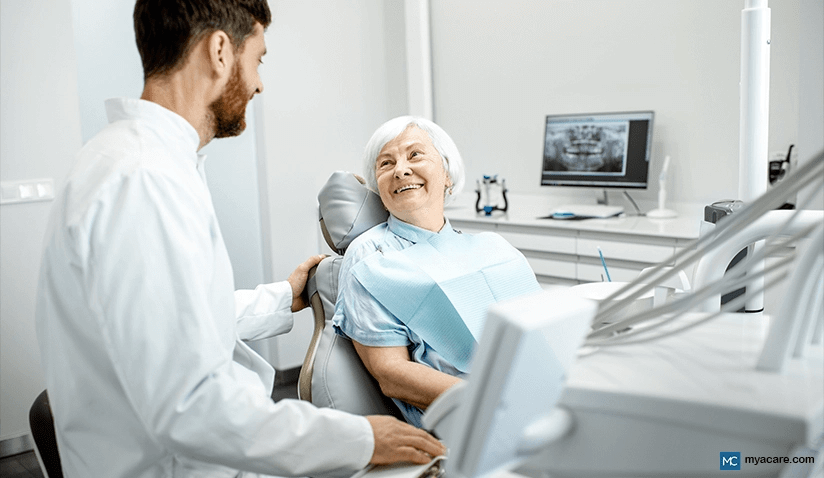How Aging Impacts Oral Health

Maintaining Oral Health in Older Adults
Benefits of Restoring Oral Health in Older Adults
Oral health plays an important role in the overall well-being of individuals. This becomes more important for an aging population as the presence of physical limitations, comorbidities, and financial issues pose significant risks to their oral health.
According to the US Census, by 2060, the number of US adults aged above 65 years is expected to reach 98 million, contributing to one-fourth of the entire population. This group is more susceptible to poor oral health due to an increased prevalence of tooth decay, gum diseases, tooth loss, and cancer. This results in impaired chewing efficiency and lower confidence in social situations, impacting their overall quality of life.
In this article, we discuss the challenges in maintaining oral health in the aging population, commonly seen oral health problems, and ways to maintain oral hygiene.
What are the Challenges in Maintaining Oral Health in the Aging Population?
Here are some of the barriers to optimal oral health that emerge with age:
- Physical limitations: Aging individuals tend to develop physical, sensory, and cognitive impairments which reduce dexterity, making home-based oral hygiene maintenance challenging.
- Presence of comorbidities: Aging increases the risk of developing multiple chronic disorders. This leads to exposure to several medications, which, on prolonged use, may cause adverse effects such as dryness of the mouth, multiple ulcers, swelling in the gums, inflammation of the inner lining of the oral skin, altered taste sensation, and pigmentation.
- Lack of insurance and financial issues: Many older individuals do not have dental insurance, and the ones with insurance (such as federal Medicare) typically do not have routine dental care covered. Besides, post-retirement, most individuals have limited or no additional source of income. They mostly rely on their savings. Hence, they tend to abandon their routine dental clinic visits or ignore their oral health issues to avoid financial burdens.
What are the Benefits of Restoring Oral Health in the Aging Population?
The advantages of restoring oral health in older adults are as follows:
- Improved chewing efficiency: Loss of teeth or the presence of unrestored teeth impacts individuals’ ability to chew food efficiently, limiting their food choices. This may, in turn, increase the risk of malnourishment. Preservation of natural teeth or restoration of lost teeth in aged individuals improves their chewing efficiency and enables them to relish all kinds of food.
- Improved quality of life: A healthy dentition and pleasing dental appearance provide both functional and psychological benefits to individuals, contributing to a better quality of life. Besides, the presence of bad breath, the unaesthetic appearance of teeth, or missing teeth may cause individuals to be conscious of their appearance, limiting their social interactions.
- Improved cognitive abilities: Research suggests that individuals with a greater number of natural teeth have better cognitive functions.
- Longevity: Recent research suggests that higher life expectancy was reported in individuals with a greater number of natural teeth. In addition, tooth loss is associated with the onset of disability.
What are the Common Oral Health Problems Among Older Adults?
Older individuals often face these oral health concerns:
- Tooth decay: Tooth decay, especially on root surfaces, is a major oral health problem in older adults. It is estimated that about 95% of older adults above 65 years of age have 1 cavity at least. This could be attributed to poor diet, increased dryness of the mouth due to medications, age-related changes in the saliva, and exposure of the root surfaces of teeth due to receding gums). Even individuals who use tobacco and have poor oral hygiene are at risk of developing caries.
- Gum diseases: Periodontal diseases, infectious diseases of the gums and tooth-supporting bone, are common among elderly individuals. This was mainly caused by the accumulation of tartar, which is rich in bacteria. This results in bad breath, bleeding, swollen gums, loosening of teeth, and pulling away of gums. Uncontrolled diabetes, smoking, and aging increase the likelihood of developing gum diseases.
- Tooth loss: Complete tooth loss is prevalent in older individuals. Longstanding untreated decay or gum diseases often lead to partial or complete tooth loss. This causes difficulty in chewing food, resulting in nutritional deficiencies. Research suggests that at least 20 functional teeth (10 antagonist pairs) are required for good mastication.
- Dryness of mouth: Dryness of mouth or xerostomia is common among older adults of 65 years of age. This is an adverse effect of medications used to treat comorbidities, such as uncontrolled diabetes, hypertension, Alzheimer’s disease, or Parkinson’s disease. Prolonged dryness of the mouth can lead to mucositis (inflammation of the skin lining of the oral cavity), tooth decay, chapped lips, and grooves on the tongue.
- Oral cancer: The risk of oral and pharyngeal cancers is higher in adults above 65 years of age. It mainly affects the surfaces of the tongue, lips, mouth, and gum. Oral cancer is more prevalent among men. Smoking and tobacco use are common causes of oral cancers. In addition, alcohol use, human papillomavirus infection, poor oral hygiene, and long-term irritation due to dentures or fillings increase the risk of oral cancer. Individuals may experience lumps or mouth ulcers, which may cause difficulty while chewing, swallowing, or opening or closing their mouths.
- Tooth wear: Tooth wear is a condition that becomes severe with age. This mainly results in the loss of hard tooth tissue. It is caused by attrition, erosion, abrasion, or tooth abfraction. Attrition is caused by the excess friction between the upper surfaces of the upper and lower teeth. Erosion is caused by prolonged exposure to acids (intake of acidic drinks, alcohol, medicines, vomiting, or acid reflux). Meanwhile, abrasion is caused by the application of excessive pressure during brushing or using abrasive toothpaste or hard-bristled toothbrushes. Abfraction is caused by the application of heavy grinding or clenching forces on the teeth. The presence of these factors may result in thinning of the front, back, or top surfaces of teeth. Loss of the top surfaces of teeth usually leads to tooth shortening.
How Can Older Adults Maintain their Oral Health?
The following are the ways to preserve oral health in the aging population:
- Go for regular check-ups with dentists to prevent and manage dental issues at an early stage. Timely restoration of missing teeth, tooth wear, or tooth decay is recommended to improve chewing efficiency.
- Visit a dentist for periodic teeth cleaning to maintain gum health.
- Follow good oral hygiene practices recommended by the dentist.
- Consider using water flossers and interdental brushes that serve as efficient oral hygiene aids.
- Increase the intake of a high-fiber diet, which helps clean the teeth during mastication.
- Use fluoride-based toothpaste or mouthwashes (as recommended by the dentist) that lower the risk of cavities and promote the remineralization of early tooth decay.
- Limit the intake of sugar or sugar-based products that increase the risk of tooth decay.
- Sip enough water throughout the day to keep yourself hydrated. Chewing sugar-free gum also helps increase salivary flow.
- Take medications prescribed by the dentist to increase the flow of saliva and reduce dryness of the mouth.
- Moisten lips regularly using lip balms or olive oil.
- Reduce smoking and consumption of alcohol and drinks with high sugar or caffeine levels in individuals with dry mouths.
- Avoid intake of any form of tobacco to reduce the risk of mouth and throat cancer.
- Electric toothbrushes or toothbrushes with foam handles are recommended for individuals who find it difficult to hold the brush because of various ailments.
To search for the best dentists in Germany, India, Malaysia, Poland, Singapore, Spain, Thailand, Turkey, the UAE, the UK and the USA, please use the Mya Care search engine.
To search for the best healthcare providers worldwide, please use the Mya Care search engine.

Dr. Shilpy Bhandari is an experienced dental surgeon, with specialization in periodontics and implantology. She received her graduate and postgraduate education from Rajiv Gandhi University of Health Sciences in India. Besides her private practice, she enjoys writing on medical topics. She is also interested in evidence-based academic writing and has published several articles in international journals.
References:
Featured Blogs



